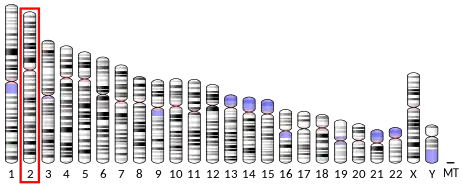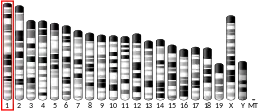60S ribosomal protein L31
60S ribosomal protein L31 is a protein that in humans is encoded by the RPL31 gene.[5][6][7]
| RPL31 | |||||||||||||||||||||||||||||||||||||||||||||||||||
|---|---|---|---|---|---|---|---|---|---|---|---|---|---|---|---|---|---|---|---|---|---|---|---|---|---|---|---|---|---|---|---|---|---|---|---|---|---|---|---|---|---|---|---|---|---|---|---|---|---|---|---|
| Identifiers | |||||||||||||||||||||||||||||||||||||||||||||||||||
| Aliases | RPL31, L31, ribosomal protein L31 | ||||||||||||||||||||||||||||||||||||||||||||||||||
| External IDs | OMIM: 617415 MGI: 2149632 HomoloGene: 133014 GeneCards: RPL31 | ||||||||||||||||||||||||||||||||||||||||||||||||||
| |||||||||||||||||||||||||||||||||||||||||||||||||||
| |||||||||||||||||||||||||||||||||||||||||||||||||||
| |||||||||||||||||||||||||||||||||||||||||||||||||||
| |||||||||||||||||||||||||||||||||||||||||||||||||||
| |||||||||||||||||||||||||||||||||||||||||||||||||||
| Wikidata | |||||||||||||||||||||||||||||||||||||||||||||||||||
| |||||||||||||||||||||||||||||||||||||||||||||||||||
Function
Ribosomes, the organelles that catalyze protein synthesis, consist of a small 40S subunit and a large 60S subunit. Together these subunits are composed of 4 RNA species and approximately 80 structurally distinct proteins. This gene encodes a ribosomal protein that is a component of the 60S subunit. The protein belongs to the L31E family of ribosomal proteins. It is located in the cytoplasm. Higher levels of expression of this gene in familial adenomatous polyps compared to matched normal tissues have been observed. As is typical for genes encoding ribosomal proteins, there are multiple processed pseudogenes of this gene dispersed through the genome.[7]
References
- GRCh38: Ensembl release 89: ENSG00000071082 - Ensembl, May 2017
- GRCm38: Ensembl release 89: ENSMUSG00000073702 - Ensembl, May 2017
- "Human PubMed Reference:". National Center for Biotechnology Information, U.S. National Library of Medicine.
- "Mouse PubMed Reference:". National Center for Biotechnology Information, U.S. National Library of Medicine.
- Nobori T, Hexdall LE, Carson DA (September 1989). "cDNA sequence of human ribosomal protein L31". Nucleic Acids Research. 17 (17): 7105. doi:10.1093/nar/17.17.7105. PMC 318439. PMID 2780320.
- Yoshihama M, Uechi T, Asakawa S, Kawasaki K, Kato S, Higa S, Maeda N, Minoshima S, Tanaka T, Shimizu N, Kenmochi N (March 2002). "The human ribosomal protein genes: sequencing and comparative analysis of 73 genes". Genome Research. 12 (3): 379–90. doi:10.1101/gr.214202. PMC 155282. PMID 11875025.
- "Entrez Gene: RPL31 ribosomal protein L31".
- Yarden RI, Brody LC (2001). "Identification of proteins that interact with BRCA1 by Far-Western library screening". Journal of Cellular Biochemistry. 83 (4): 521–31. doi:10.1002/jcb.1257. PMID 11746496. S2CID 29703139.
External links
Further reading
- Wool IG, Chan YL, Glück A (1996). "Structure and evolution of mammalian ribosomal proteins". Biochemistry and Cell Biology. 73 (11–12): 933–47. doi:10.1139/o95-101. PMID 8722009.
- Chester KA, Robson L, Begent RH, Talbot IC, Pringle JH, Primrose L, Macpherson AJ, Boxer G, Southall P, Malcolm AD (December 1989). "Identification of a human ribosomal protein mRNA with increased expression in colorectal tumours". Biochimica et Biophysica Acta (BBA) - Gene Structure and Expression. 1009 (3): 297–300. doi:10.1016/0167-4781(89)90119-x. PMID 2597680.
- Kato S, Sekine S, Oh SW, Kim NS, Umezawa Y, Abe N, Yokoyama-Kobayashi M, Aoki T (December 1994). "Construction of a human full-length cDNA bank". Gene. 150 (2): 243–50. doi:10.1016/0378-1119(94)90433-2. PMID 7821789.
- Bonaldo MF, Lennon G, Soares MB (September 1996). "Normalization and subtraction: two approaches to facilitate gene discovery". Genome Research. 6 (9): 791–806. doi:10.1101/gr.6.9.791. PMID 8889548.
- Kenmochi N, Kawaguchi T, Rozen S, Davis E, Goodman N, Hudson TJ, Tanaka T, Page DC (May 1998). "A map of 75 human ribosomal protein genes". Genome Research. 8 (5): 509–23. doi:10.1101/gr.8.5.509. PMID 9582194.
- Andersen JS, Lyon CE, Fox AH, Leung AK, Lam YW, Steen H, Mann M, Lamond AI (January 2002). "Directed proteomic analysis of the human nucleolus". Current Biology. 12 (1): 1–11. doi:10.1016/S0960-9822(01)00650-9. PMID 11790298. S2CID 14132033.
- Odintsova TI, Müller EC, Ivanov AV, Egorov TA, Bienert R, Vladimirov SN, Kostka S, Otto A, Wittmann-Liebold B, Karpova GG (April 2003). "Characterization and analysis of posttranslational modifications of the human large cytoplasmic ribosomal subunit proteins by mass spectrometry and Edman sequencing". Journal of Protein Chemistry. 22 (3): 249–58. doi:10.1023/A:1025068419698. PMID 12962325. S2CID 10710245.
- Brandenberger R, Wei H, Zhang S, Lei S, Murage J, Fisk GJ, Li Y, Xu C, Fang R, Guegler K, Rao MS, Mandalam R, Lebkowski J, Stanton LW (June 2004). "Transcriptome characterization elucidates signaling networks that control human ES cell growth and differentiation". Nature Biotechnology. 22 (6): 707–16. doi:10.1038/nbt971. PMID 15146197. S2CID 27764390.
- Rush J, Moritz A, Lee KA, Guo A, Goss VL, Spek EJ, Zhang H, Zha XM, Polakiewicz RD, Comb MJ (January 2005). "Immunoaffinity profiling of tyrosine phosphorylation in cancer cells". Nature Biotechnology. 23 (1): 94–101. doi:10.1038/nbt1046. PMID 15592455. S2CID 7200157.
- Olsen JV, Blagoev B, Gnad F, Macek B, Kumar C, Mortensen P, Mann M (November 2006). "Global, in vivo, and site-specific phosphorylation dynamics in signaling networks". Cell. 127 (3): 635–48. doi:10.1016/j.cell.2006.09.026. PMID 17081983. S2CID 7827573.



